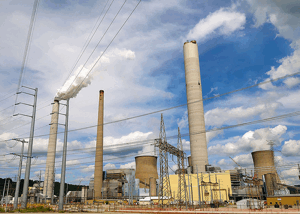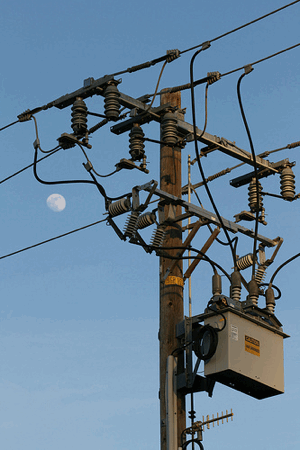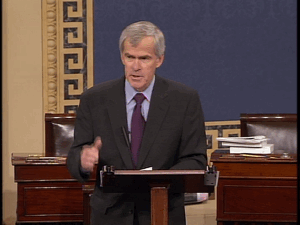Climate Bill Backup Plan
Air Date: Week of July 2, 2010

A 3,000 MW coal-fired power plant in West Virginia. Emerging Senate climate legislation could place a cap on just the utility sector. (Photo: haglundc)
With little time left on the legislative calendar, senators hoping to take action on climate change are abandoning controversial plans to limit emissions from all sectors of the economy. Living on Earth's Mitra Taj reports on the fallback option - putting a cap on just electric utilities, which are responsible for about a third of greenhouse gas emissions.
Transcript
YOUNG: It’s Living on Earth, I’m Jeff Young. It’s crunch time on Capitol Hill for energy and climate change. President Obama called senators to the White House to try to find some bipartisan agreement. Democratic leaders want some sort of cap on greenhouse gases; Republican leaders call that a national energy tax. The White House meeting might have opened a new middle path: a plan to limit emissions from just one part of the nation’s energy economy, power plants. Living on Earth’s Mitra Taj explores where that path might lead.
TAJ: When it comes to energy and climate change, the Senate has no shortage of ideas. Half a dozen proposals have been introduced, and many senators hoped the recent talk with President Obama would clear up which one should lead the way. Instead, the bipartisan group of 23 senators returned to Capitol Hill with few specifics:
DORGAN: …There wasn’t a decision point at this meeting, it was a roundtable discussion…
MURKOWSKI: Well, it was a good conversation- ‘cause I think it’s fair to say there was no consensus about what the path forward is…
LIEBERMAN: The president was very strong that this is the moment to aim high.
CARPER: He urged us to aim high, and everybody had a chance to say their piece- he would interact with people as they would say their piece. We came back in the end and he says okay, this is what I think I’m hearing.
TAJ: Senator Tom Carper, a Delaware Democrat, said that while the President didn’t lead the group to any particular policy, it became clear that one approach to climate change would be more politically viable than others.
CARPER: I sensed a willingness to address carbon dioxide with respect to utilities.
TAJ: Limiting emissions from just electric utilities is a new compromise possibility. It differs from the House climate change bill passed a year ago that would cap emissions from all sectors of the economy. Greenhouse gas polluters would buy and sell pollution permits with one another to find the cheapest way to keep their emissions under a declining target. But Paul Bledsoe, an analyst with the Bipartisan Policy Center, said a complimentary senate bill, sponsored by John Kerry and Joe Lieberman, hasn’t found much support.

Electric utilities account for roughly one third of greenhouse gas emissions. (Photo: Philip Bouchard)
BLEDSOE: I think there has been a sense for some time that it was going to be difficult to pass an economy-wide measure in the U.S. Senate. And, it looks right now that the most aggressive bill that could emerge from the Senate on climate would be one that put emissions limits on the electric utility industry alone.
TAJ: Senators Kerry and Lieberman said they’d be willing to consider starting with a cap on just utilities, and leave transportation and manufacturing for later. Bledsoe said as far as compromises go, it’s not a terrible one to make. For one, the coal-burning utility sector is responsible for about a third of U.S. greenhouse gas emissions.
BLEDSOE: So it’s by far the biggest piece of the U.S. domestic emissions reductions. And every successful cap has started with the utility sector. California first regulated the utility sector, Europe first regulated the utility sector. So, capping emissions from power plants first seems to be a very logical step in beginning to reduce emissions from the whole economy.
TAJ: The power plant association Edison Electric Institute isn’t ready to comment on limiting emissions from only its industry. Some utilities have long been opposed to a cap, but others, like Duke Energy, are in favor.
WILLIAMS: We’re willing to do that. I would say, in essence, half a loaf is better than no loaf at all.
TAJ: Tom Williams is spokesman for Duke Energy, one of the biggest utility companies—and biggest single emitters—in the country, and one that’s been active in supporting cap-and-trade legislation. Williams says cap and trade worked for the industry before—cutting sulfur dioxide emissions during the acid rain program of the early 1990s. He says a similar system can work for the industry with carbon dioxide.
WILLIAMS: We’re used to how these markets work, and we’re able to, you know, with the cap and trade approach, we’re able to meet very tough regulations at costs much less expensive than we were otherwise able to meet them. So we’ve been there before, we’ve made these types of systems work, and we’re a good industry to start with.
TAJ: Focusing on just one sector of the economy probably won’t deliver the amount of emissions cuts the President is hoping for. He said he wants reductions of 17% by 2020. But Robert Stavins, a Harvard economist, says it’s unlikely that target can be achieved from capping just the utility sector.
STAVINS: Rather than achieving something on the order of 17% reductions by 2020, instead, you’d probably find reductions of about one third of that.
TAJ: A third of the President’s goal is quite a step back for many green groups who were pushing the President to make even deeper cuts. But Steve Cochran, director of the Environmental Defense Fund’s national climate campaign, says it’s better than the energy-only bills that some senators are pushing. Those proposals would support renewable energy without mandating a limit on emissions.

Senator Jeff Bingaman (D-NM) has written bipartisan energy bills and could be the author of new legislation to target emissions restrictions on power plants.
COCHRAN: Zero is not a good outcome, and that’s one of the options on the table. So if somebody wants to pass an energy-only bill, they’ll certainly do so without our support, they may do it over our opposition if that’s what they decide to do.
TAJ: For all the talk about a utility-only cap, a proposal has yet to be written. Senator Jeff Bingaman, chairman of the Senate Energy and Natural Resources Committee, recently said he’s working on one, but is unsure there’ll be enough support for him to introduce it. Energy and climate proposals will be tied together with an oil spill bill and taken up by the full Senate in mid-July.
For Living on Earth, I’m Mitra Taj in Washington.
Living on Earth wants to hear from you!
Living on Earth
62 Calef Highway, Suite 212
Lee, NH 03861
Telephone: 617-287-4121
E-mail: comments@loe.org
Newsletter [Click here]
Donate to Living on Earth!
Living on Earth is an independent media program and relies entirely on contributions from listeners and institutions supporting public service. Please donate now to preserve an independent environmental voice.
NewsletterLiving on Earth offers a weekly delivery of the show's rundown to your mailbox. Sign up for our newsletter today!
 Sailors For The Sea: Be the change you want to sea.
Sailors For The Sea: Be the change you want to sea.
 The Grantham Foundation for the Protection of the Environment: Committed to protecting and improving the health of the global environment.
The Grantham Foundation for the Protection of the Environment: Committed to protecting and improving the health of the global environment.
 Contribute to Living on Earth and receive, as our gift to you, an archival print of one of Mark Seth Lender's extraordinary wildlife photographs. Follow the link to see Mark's current collection of photographs.
Contribute to Living on Earth and receive, as our gift to you, an archival print of one of Mark Seth Lender's extraordinary wildlife photographs. Follow the link to see Mark's current collection of photographs.
 Buy a signed copy of Mark Seth Lender's book Smeagull the Seagull & support Living on Earth
Buy a signed copy of Mark Seth Lender's book Smeagull the Seagull & support Living on Earth

